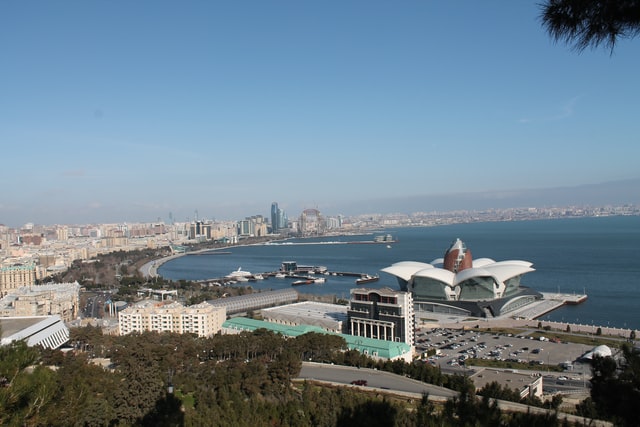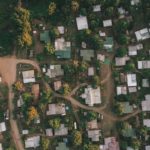Azerbaijan Tourism: A Fair-Trade Spin on Travel?

When some people travel, their itineraries do not venture beyond well-explored tourist destinations. As for me, I’ll admit that Paris and Barcelona are spectacular. But, something about elbowing your way through crowds of tourists to catch a glimpse of a well-known monument (one you’ve already seen countless times in photographs) fails to satisfy me.
I’ve grown to truly relish travel to obscure, isolated places little-known to the outside world. Where a relative lack of globalization has preserved sceneries, cultures and lifestyles that are wholly unfamiliar. But what are the best way to access these places, while having the most meaningful experiences while you’re there?
How can a privileged western tourist engage in tourism that benefits both the traveler and the community?
I’d heard about community-based tourism (CBT) projects several times in the past. Maybe this was just my innate skepticism, but I pictured an unsettling image of tourists heading off to Mongolia, spending the weekend in a yurt, and watching the locals put on an ethnographic show tailored to westerners.
Many of us who travel, particularly off-the-beaten path, strive to be mindful of the negative impact tourism can have on communities. Particularly those in impoverished and politically contentious areas where cultures face internal and external challenges that threaten their integrity and future. Do the CBT funds even benefit these people directly? How can a privileged western tourist engage in tourism in a way that benefits both the traveler and the community?
This is a city that is modernizing impossibly fast, and where luxury hotels are being built at an astonishing rate.
I currently live in Baku, the capital of Azerbaijan. This is a city that is modernizing impossibly fast, and where luxury hotels are being built at an astonishing rate. Before I even got here, I was eager to gain access to unexplored corners of the country. Additionally, I wanted to have an experience truly unique to Azerbaijan.
Several people recommended CBT Azerbaijan, an organization run by former Peace Corps volunteers. This non-profit strives to connect rural communities with travelers seeking access to the people and natural beauty of remote regions.
Though community-based tourism projects exist worldwide, and operate in a myriad of ways, I felt I had an extraordinary experience. After being in a rural Caucasian village, I had an experience that was not only spectacular, but I also found that CBT Azerbaijan truly benefits rural communities in the country.
How does it work?
CBT Azerbaijan’s website features a list of regions and villages in which they operate. Some even showing photos of and info on the local families with which one could stay. My friends and I picked the region we wanted to visit. We got in touch with the local administrator and told him our plans.
After a few days, we got the name and contact info of Xalid, a local schoolteacher living in Laza. Laza is a village of around 180 people in northern Azerbaijan. Traveling to remote regions in Azerbaijan can be tricky. Particularly in the winter. But in my experience, our host was perfectly willing to meet us in the largest regional city and help us arrange a shared taxi to Laza village.
But let’s be honest, a perfected squat technique separates the travelers from the tourists!
Staying in Laza with Xalid cost us each around 40 dollars a night. A fee that included a home-cooked breakfast, lunch, and dinner. The food was delicious and unbelievably fresh. The vegetables were grown in the outdoor garden. And, all of the dairy products came from the cows in their barn.
The homestays on CBT Azerbaijan typically have fairly nice amenities. Including, electricity, running water, comfortable and clean rooms. Though nearly all lack internet and western toilets.
But let’s be honest, a perfected squat technique separates the travelers from the tourists!
What you do on your time is basically up to you. Laza village gave us access to some of the most stunning hiking routes in the Greater Caucasus mountain range. We also had plenty of interaction with the locals. I ended up being too tired to get up and milk the cows at 7 AM, but I’ll save that for my next CBT trip.
Azerbaijan Tourism: A Fair-Trade Spin on Travel?
How does CBT benefit local communities?
CBT projects, and tourism in general, can be valuable tools for economic development. In the case of CBT Azerbaijan and many other projects, the proceeds go straight into the hands of the hosts and local administrators. While this in itself is great, many of these non-profits have a mission that goes beyond simply getting money into the pockets less fortunate people.
Hosts in rural regions receive valuable training on fire safety, sanitation, managing finances, and more. This knowledge ultimately benefits not only the hosts themselves, but the community as a whole, as information is spread from family to family.
Tourism can also encourage people in these communities to truly recognize the value of their homes. One of the Laza locals, Elxan, expressed to me how regularly interacting with foreigners and seeing his community through their eyes made him truly appreciate its gems: “I could never live in Baku. This, for me, is paradise.”
What did I gain from the experience?
Stunning mountain scenery, delicious food and the warmth of the locals aside, my trip to Laza was unique and eye-opening.
Xalid, my host, as well as the entire population of Laza village and the Qusar region as a whole are Lezgis, one of the predominant ethnic minorities of Azerbaijan and Dagestan (a conflict-ridden federal subject of Russia in the North Caucasus). In my experiences in the former USSR, Lezgis are typically referred to as “crazy terrorists.”
They are also known as backwards people inhabiting war-torn hellholes. But these descriptions were a world away from the warm, kind-hearted and impossibly hospitable people I met on my trip.
One night I attended a local concert in nearby Qusar City, and had the opportunity to enjoy a local Lezgi rap battle. Yes, you read that correctly. It also included lezginka traditional dance.
Through CBT, I gained valuable insight to the challenges faced by ethnic minorities in Azerbaijan. Xalid, a schoolteacher, lamented that even in Lezgi-majority regions, schoolchildren are permitted no more than two hours of weekly instruction in their native language, which is currently listed as “vulnerable” on UNESCO’s atlas of endangered languages. One night I attended a local concert in nearby Qusar City, and had the opportunity to enjoy a local Lezgi rap battle. Yes, you read that correctly. It also included lezginka traditional dance.
As an aspiring linguist with an interest in language policy and minority-language revitalization projects, having faces, names, and emotions to connect to a people and struggle that was before only peripherally on my radar further fueled my passion to make a difference in this part of the world.
Azerbaijan Tourism: A Fair-Trade Spin on Travel?
The verdict?
If you want to experience Eurasian community-based tourism at its best, CBT Azerbaijan is a fantastic way to do it. Your heart, soul, and tastebuds will be deeply satisfied.
CBT Azerbaijan’s website is currently undergoing maintenance, but if you’re interested in planning a trip and would like more information, contact Elxan at [email protected]. Azerbaijan Tourism: A Fair-Trade Spin on Travel?
Azerbaijan Tourism: A Fair-Trade Spin on Travel?
Related Reading
Travel Azerbaijan: 7 Reasons to Visit the Land of Fire
Have you traveled to Azerbaijan? What were your impressions? Email us at editor@pinkpangea.com for information about sharing your experience and advice with the Pink Pangea community. We can’t wait to hear from you.
Azerbaijan Tourism: A Fair-Trade Spin on Travel? photo credit: Unsplash.









Dear CBT Travelers,
We would like to inform and send our new webpages:
www.cbtazerbaijan.org
https://www.facebook.com/CBTAZE/
Thank you and we look forward to hearing from you.